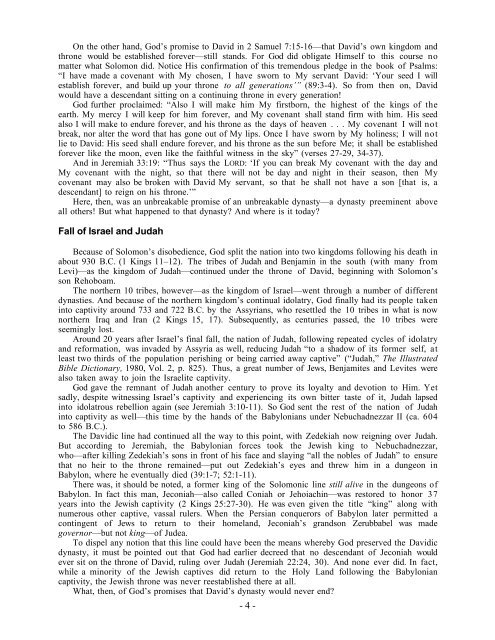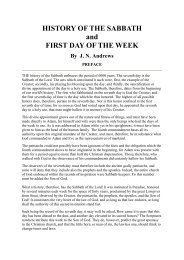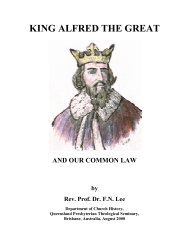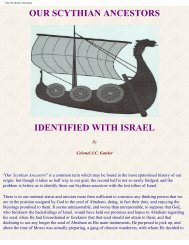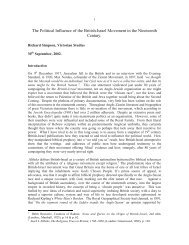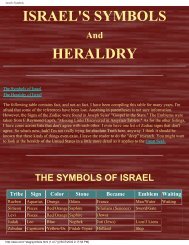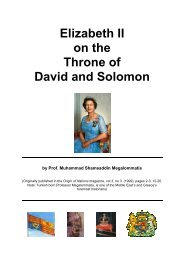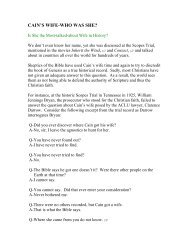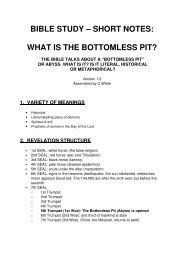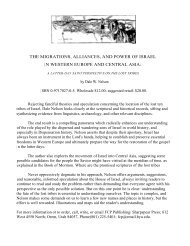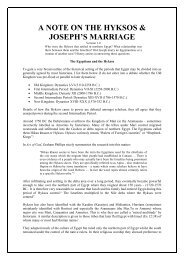The Throne of Britain: Its Biblical Origin and Future - Origin of Nations
The Throne of Britain: Its Biblical Origin and Future - Origin of Nations
The Throne of Britain: Its Biblical Origin and Future - Origin of Nations
You also want an ePaper? Increase the reach of your titles
YUMPU automatically turns print PDFs into web optimized ePapers that Google loves.
On the other h<strong>and</strong>, God’s promise to David in 2 Samuel 7:15-16—that David’s own kingdom <strong>and</strong><br />
throne would be established forever—still st<strong>and</strong>s. For God did obligate Himself to this course no<br />
matter what Solomon did. Notice His confirmation <strong>of</strong> this tremendous pledge in the book <strong>of</strong> Psalms:<br />
“I have made a covenant with My chosen, I have sworn to My servant David: ‘Your seed I will<br />
establish forever, <strong>and</strong> build up your throne to all generations’” (89:3-4). So from then on, David<br />
would have a descendant sitting on a continuing throne in every generation!<br />
God further proclaimed: “Also I will make him My firstborn, the highest <strong>of</strong> the kings <strong>of</strong> the<br />
earth. My mercy I will keep for him forever, <strong>and</strong> My covenant shall st<strong>and</strong> firm with him. His seed<br />
also I will make to endure forever, <strong>and</strong> his throne as the days <strong>of</strong> heaven . . . My covenant I will not<br />
break, nor alter the word that has gone out <strong>of</strong> My lips. Once I have sworn by My holiness; I will not<br />
lie to David: His seed shall endure forever, <strong>and</strong> his throne as the sun before Me; it shall be established<br />
forever like the moon, even like the faithful witness in the sky” (verses 27-29, 34-37).<br />
And in Jeremiah 33:19: “Thus says the LORD: ‘If you can break My covenant with the day <strong>and</strong><br />
My covenant with the night, so that there will not be day <strong>and</strong> night in their season, then My<br />
covenant may also be broken with David My servant, so that he shall not have a son [that is, a<br />
descendant] to reign on his throne.’”<br />
Here, then, was an unbreakable promise <strong>of</strong> an unbreakable dynasty—a dynasty preeminent above<br />
all others! But what happened to that dynasty And where is it today<br />
Fall <strong>of</strong> Israel <strong>and</strong> Judah<br />
Because <strong>of</strong> Solomon’s disobedience, God split the nation into two kingdoms following his death in<br />
about 930 B.C. (1 Kings 11–12). <strong>The</strong> tribes <strong>of</strong> Judah <strong>and</strong> Benjamin in the south (with many from<br />
Levi)—as the kingdom <strong>of</strong> Judah—continued under the throne <strong>of</strong> David, beginning with Solomon’s<br />
son Rehoboam.<br />
<strong>The</strong> northern 10 tribes, however—as the kingdom <strong>of</strong> Israel—went through a number <strong>of</strong> different<br />
dynasties. And because <strong>of</strong> the northern kingdom’s continual idolatry, God finally had its people taken<br />
into captivity around 733 <strong>and</strong> 722 B.C. by the Assyrians, who resettled the 10 tribes in what is now<br />
northern Iraq <strong>and</strong> Iran (2 Kings 15, 17). Subsequently, as centuries passed, the 10 tribes were<br />
seemingly lost.<br />
Around 20 years after Israel’s final fall, the nation <strong>of</strong> Judah, following repeated cycles <strong>of</strong> idolatry<br />
<strong>and</strong> reformation, was invaded by Assyria as well, reducing Judah “to a shadow <strong>of</strong> its former self, at<br />
least two thirds <strong>of</strong> the population perishing or being carried away captive” (“Judah,” <strong>The</strong> Illustrated<br />
Bible Dictionary, 1980, Vol. 2, p. 825). Thus, a great number <strong>of</strong> Jews, Benjamites <strong>and</strong> Levites were<br />
also taken away to join the Israelite captivity.<br />
God gave the remnant <strong>of</strong> Judah another century to prove its loyalty <strong>and</strong> devotion to Him. Yet<br />
sadly, despite witnessing Israel’s captivity <strong>and</strong> experiencing its own bitter taste <strong>of</strong> it, Judah lapsed<br />
into idolatrous rebellion again (see Jeremiah 3:10-11). So God sent the rest <strong>of</strong> the nation <strong>of</strong> Judah<br />
into captivity as well—this time by the h<strong>and</strong>s <strong>of</strong> the Babylonians under Nebuchadnezzar II (ca. 604<br />
to 586 B.C.).<br />
<strong>The</strong> Davidic line had continued all the way to this point, with Zedekiah now reigning over Judah.<br />
But according to Jeremiah, the Babylonian forces took the Jewish king to Nebuchadnezzar,<br />
who—after killing Zedekiah’s sons in front <strong>of</strong> his face <strong>and</strong> slaying “all the nobles <strong>of</strong> Judah” to ensure<br />
that no heir to the throne remained—put out Zedekiah’s eyes <strong>and</strong> threw him in a dungeon in<br />
Babylon, where he eventually died (39:1-7; 52:1-11).<br />
<strong>The</strong>re was, it should be noted, a former king <strong>of</strong> the Solomonic line still alive in the dungeons <strong>of</strong><br />
Babylon. In fact this man, Jeconiah—also called Coniah or Jehoiachin—was restored to honor 37<br />
years into the Jewish captivity (2 Kings 25:27-30). He was even given the title “king” along with<br />
numerous other captive, vassal rulers. When the Persian conquerors <strong>of</strong> Babylon later permitted a<br />
contingent <strong>of</strong> Jews to return to their homel<strong>and</strong>, Jeconiah’s gr<strong>and</strong>son Zerubbabel was made<br />
governor—but not king—<strong>of</strong> Judea.<br />
To dispel any notion that this line could have been the means whereby God preserved the Davidic<br />
dynasty, it must be pointed out that God had earlier decreed that no descendant <strong>of</strong> Jeconiah would<br />
ever sit on the throne <strong>of</strong> David, ruling over Judah (Jeremiah 22:24, 30). And none ever did. In fact,<br />
while a minority <strong>of</strong> the Jewish captives did return to the Holy L<strong>and</strong> following the Babylonian<br />
captivity, the Jewish throne was never reestablished there at all.<br />
What, then, <strong>of</strong> God’s promises that David’s dynasty would never end<br />
- 4 -


